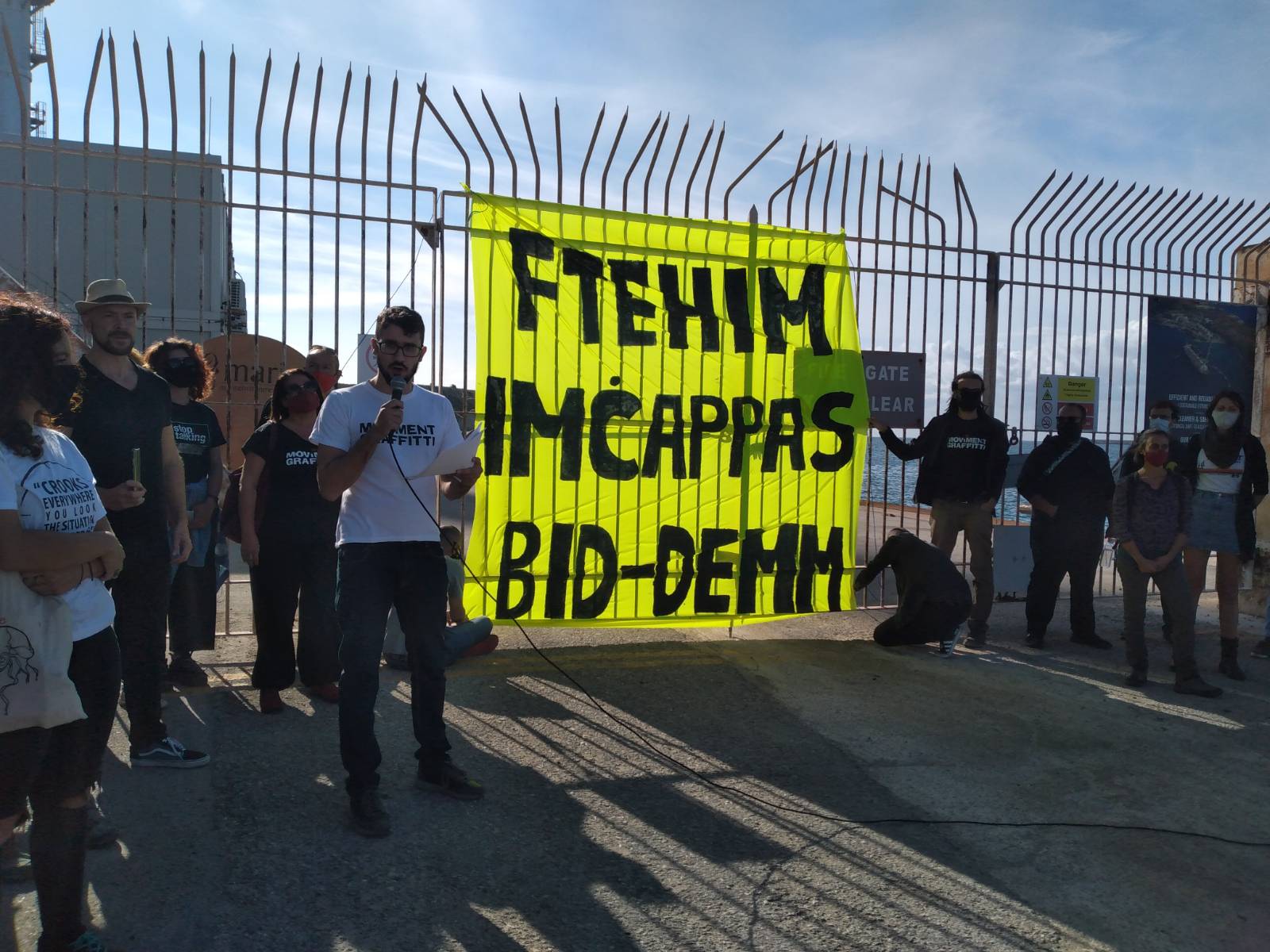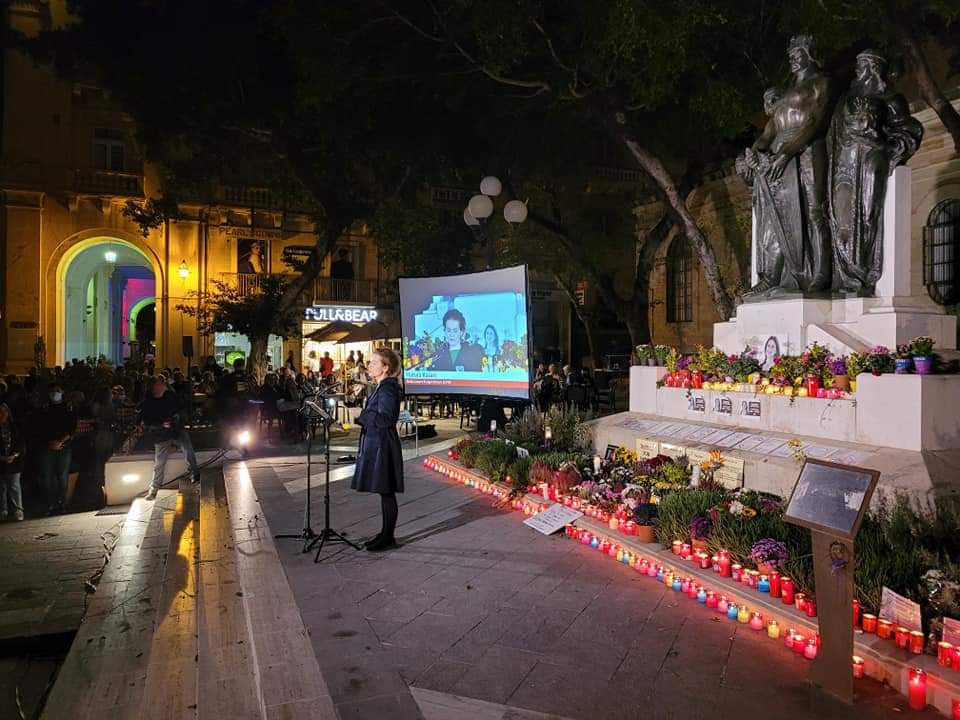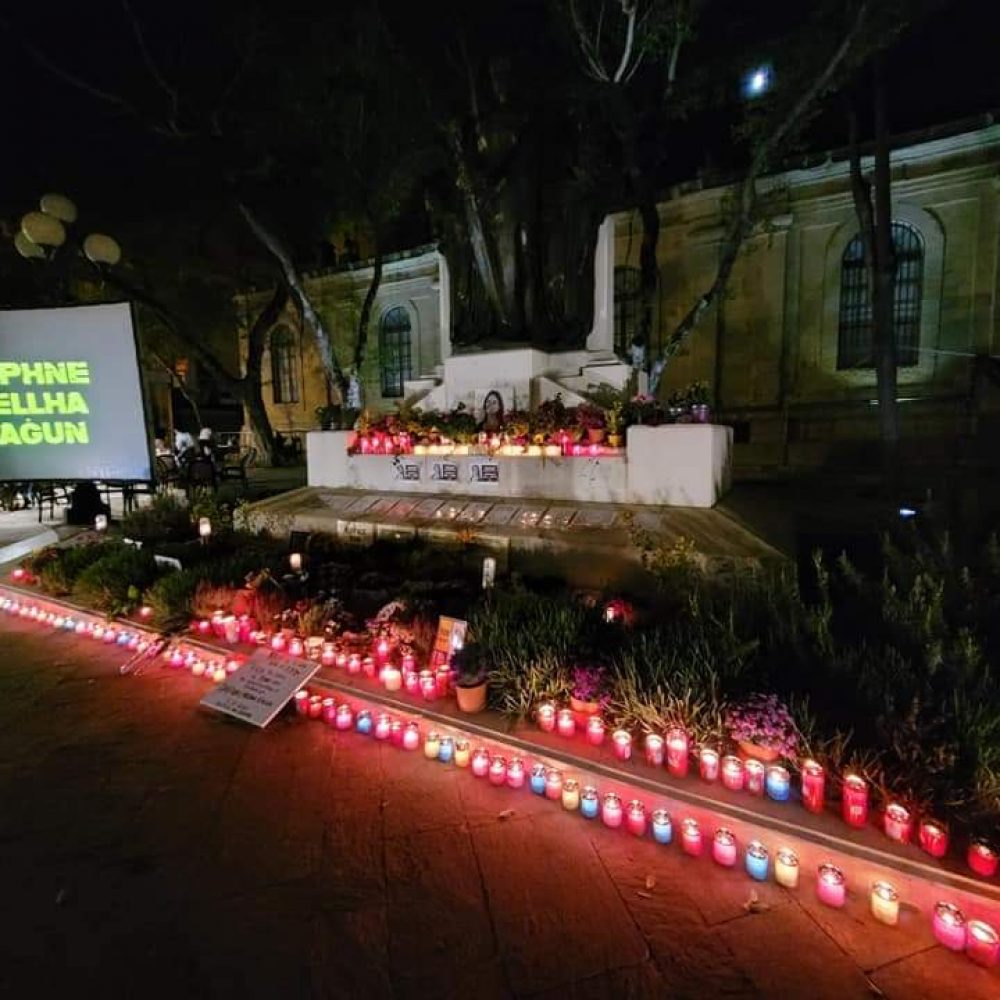The fourth anniversary of the assassination of Daphne Caruana Galizia at 3 pm on Monday 16 October 2017 was marked by a series of events organised by civil society groups and other NGOs.
Local activist groups Repubblika and Occupy Justice put on a two-week roving exhibition in the lead-up to the anniversary, followed by, on the anniversary date itself, a silent vigil in the spot Caruana Galizia was killed, a mass and an evening vigil calling for truth and justice to be fully served.
Moviment Graffitti held a protest at the gate of the Electrogas power station: the “monument of corruption” that Caruana Galizia had exposed years before, and was about to publish explosive new information about. The civil society group demanded a full, criminal investigation of the deal that evidence so far has proven was the motive behind Caruana Galizia’s assassination.

Standing before a massive green banner emblazoned with the words “A deal soaked in blood,” activist Robert Fenech explained that Graffitti chose to hold its event at the gates of the project that turned out to be one of the “most corrupt deals the country has ever witnessed.”
The group demanded that shamed former minister Konrad Mizzi be compelled to answer questions about his involvement in the deal, as should alleged financial criminal and ex OPM chief of staff, Keith Schembri, both seen as the architects of the project. They also reiterated their demand for the resignation of Justice Minister Edward Zammit Lewis, whose intimate friendship with the Electrogas shareholder now facing trial for masterminding the assassination of Caruana Galizia has compromised him fatally.
The first-ever Daphne Caruana Galizia prize for journalism was awarded to the Pegasus Project in Brussels on 14 October, her family and supporters were already gathering, physically and virtually, to remember and mourn her, and to demand justice and change from the government that’s so far paid lip service to calls for reform, but has failed to make any significant changes at all.
Local initiatives to commemorate Caruana Galizia, her work and her courage, were boosted by the participation of international groups, speakers and writers. Representatives from international journalism groups, including Reporters Without Borders, Article 19, the Committee to Protect Journalists, the European Journalism Federation and the European Centre for Press and Media Freedom were also in Malta to participate, joining the call for full justice for Caruana Galizia, better protection for journalists and an end to the culture of impunity that enabled her killers to act.

The main focus of several of the events was the brazen continuation of the culture of impunity that allowed so many corrupt members of government and their associates in the worlds of big business and crime to operate without fear of being apprehended. Speakers across protests, discussions and vigils talked about the fact that the government of Prime Minister Robert Abela may have shuffled ministers about, but nothing has really changed in the four years since that brutal crime robbed the island of the trail-blazing, courageous journalist who exposed government crime, corruption and malfeasance on a daily basis, for years.
The public inquiry into her assassination that concluded in June this year, laid the blame for the murder squarely at the feet of the state. Despite pledges from the government to implement all the findings of the inquiry, four months down the line, nothing has been done.
But court testimony and confessions from several of the trigger-men, now in custody and awaiting trial, proves the involvement of the state: in some alleged cases, the direct involvement of members of the government, as well as the over-arching environment of unchecked corruption and criminality that made criminals believe they’d get away with a crime of this magnitude.
The criminals in the government, or shunted aside in Malta’s deadly version of musical chairs, are still running free. None of the politicians exposed by Caruana Galizia, and other newsrooms who followed her stories later, have been properly investigated, charged or convicted. None of the stories of rampant corruption and malfeasance that she uncovered and reported on have been followed up in any credible way.
Hamstrung magisterial inquiries costing millions, parliamentary public accounts committee probes that drag on for years, police ‘questioning’ of suspects that fizzles out after a flurry of interest.
Her stories, though, have been continued. Her murderers did not succeed in silencing her, despite the heinous attempt to do so by robbing her of her life, and ripping her away from her family, her friends, her colleagues and her supporters.
Newsrooms across Malta, and abroad, continue to investigate the network of criminality the government of disgraced former Prime Minister Joseph Muscat has been shown to have created, with pariah regimes such as Azerbaijan, secret companies in places such as Panama and Dubai, and opening the doors to dangerous organised crime groups from across Europe to use Malta as a money-laundering hub.
Moviment Graffitti said: “There is no better way to recall a journalist’s death than to honour her work.” There will be no peace, no healing, no way of putting this behind us “until the people she exposed are brought to justice and the corrupt deals she uncovered are investigated.”
The following project is weekly Maltese Roundups prepared by The Shift News (Malta) offering the latest news in the Daphne Caruana Galizia case.

